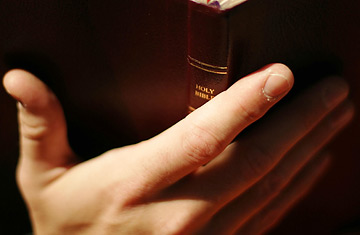
(4 of 4)
I could find little to object to here and much to admire. Here was a conservative teacher going way beyond The Bible and Its Influence, but not in a predictable direction. She name-checked the Crusades, avoided faith declarations and treated the Bible as a living document to be pored over rather than blindly accepted. She even managed to fit in other faiths. Moving on through the Sermon on the Mount, she pulled out another sheaf of papers. "So I'm gonna give these examples of Golden Rules from different cultures. Read 'em and share 'em with the class." They ran from Buddhism to Baha'i. And most did sound a lot alike. Shouted one girl: "The Golden Rule remix!"
One successful class teaching the Bible as an academic subject hardly guarantees that it will work every time or everywhere. But Kendrick shows that it can work. "Bad courses will be taught," predicts Prothero, sitting in his B.U. office with the inscription Sans Dieu Rien--Without God, Nothing--carved above the fireplace. (True to his nonsectarian position, he calls its presence "a coincidence. This used to be a private house.") "People will teach it as a Sunday-school class. And we'll do what we always do when unconstitutional stuff happens in America. We'll get a court to tell us what to do, and then we'll fix it."
Prothero may be overly sanguine about the workings of the U.S. court system. But even if he's wrong, this shouldn't stop schools from making some effort to teach the Bible. The study doesn't have to be mandatory. In a national school system overscheduled with basic skills, other topics such as history and literature deserve core status more than Scripture--provided that these classes address it themselves, where appropriate. But if an elective is offered, it should be twinned mandatorily with a world religions course, even if that would mean just a semester of each. Within that period students could be expected to read and discuss Genesis, the Gospel of Matthew, a few Moses-on-the-mountain passages and two of Paul's letters. No one should take the course but juniors and seniors. The Bible's harmful as well as helpful uses must be addressed, which could be done by acknowledging that religious conservatives see the problems as stemming from the abuse of the holy text, while others think the text itself may be the culprit. The course should have a strong accompanying textbook on the model of The Bible and Its Influence but one that is willing to deal a bit more bluntly with the historical warts. And some teacher training is a must: at a bare minimum, about their constitutional obligations.
And, oh yes, there should be one faith test. Faith in our country. Sure, there will be bumps along the way. But in the end, what is required in teaching about the Bible in our public schools is patriotism: a belief that we live in a nation that understands the wisdom of its Constitution clearly enough to allow the most important book in its history to remain vibrantly accessible for everyone.
David Van Biema is TIME's senior religion writer. His first cover story on the topic ran in 1996
